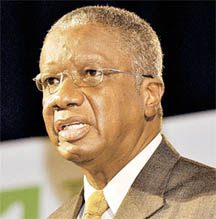Two weeks ago, Barbados’ Prime Minister, Freundel Stuart, pointed to an issue that ought to give pause for thought across Caricom. Speaking to alumni of the University of the West Indies, he asked why it was that the previously vibrant voice of the Caribbean Association of Industry and Commerce (CAIC), the Caribbean Congress of Labour (CCL) and the Caribbean Conference of Churches (CCC) was now so diminished.
Speaking on the theme of the global economic crisis and integration, Prime Minister Stuart suggested that in the past the voices of the regional private sector, the labour movement and the church were all loudly raised and heard. But today, he suggested, the resonance of all three institutions had diminished and their flame was, to quote him, burning low.
The region could, he suggested, gain much from therevitalisation of all three organisations.

This is not to suggest that these organisations are doing nothing, but to confirm Mr Stuart’s point that they no longer have regional outreach, or an opinion that can be readily understood widely, let alone an interest in providing an alternative voice to that of the politicians or commentators.

The implication of this is that these previously central players in Caribbean civil society have no new ideas, have lost their voice, become too weary to complain or have so become a part of the Caribbean establishment that they no longer want to engage in a mental fight.
All of which begs the question of who now forms public opinion in the region and who will, for the generations to come, develop and encourage debate on new ideas that build on all that might matter in the region in the future.
In his remarks, Mr Stuart spent time reminding his audience that there were success stories that the region could point to. After explaining how the global economic crisis has negatively affected the Caribbean he set out to balance the views of those he referred to as the Jeremiah commentators on regionalism.
He noted some of the region’s achievements: “From health care to education to climate change, to championing the green and blue economies, to our spectacular participation in world sports, to security arrangements, we have proven to the world that we can collaborate at the regional, national and institutional levels to achieve our development objectives”, he told alumni and guests. He cited examples of the region’s capacity to collaborate such as the University of the West Indies, the Caribbean Examinations Council, the Caribbean Epidemiology Centre, the Caribbean Environmental Health Institute and the Caribbean Health Research Council. He was particularly critical of those who saw the success or otherwise of the region only in terms of trade.
However, what the Prime Minister did not do is look forward and suggest how the region might find its way out of the maze of difficulties that it is now caught in, or from where new thinking might appear or on what debate might best be focused.
In contrast, what is often startling is that outside the region one experiences a well disseminated near blizzard of ideas and new national and international thinking that offers ideas that can be melded into policy and consciousness about everything from science to politics and social care.
This is not to suggest that there are not new ideas in the Caribbean or that its well-educated younger generations are doing or saying nothing; but to convey the sense that their often exciting ideas and thoughts for Caribbean renewal and the reinvigoration of regionalism go unheard, unpromoted, and are lost or ignored, resulting in a cynicism and a desire among some to find a future outside the region.
What Barbados’ Prime Minister did not ask is how Caribbean civil society beyond the establishment might have a voice?
In the region the alternative voice has become transient. It is the call-in programme, its close cousin the on-air debate between experts, and the newspaper column. Although there are an increasing number of blogs and a growing use of social media, none of this so far amounts to the type of movement that might resurrect a sense of direction and commitment to regionalism among those who might recreate the enthusiasm and passion of earlier generations or promote ideas that cement a new Caribbean narrative about the region’s place in the world.
Alarmingly the opposite may now be happening. In a recent conversation with a thoughtful and successful UWI graduate who holds a significant post in the region, she made clear that her experience, while an undergraduate at a campus away from home, was that her fellow students’ thinking divided stridently along national lines and there was little interest in any regional consensus.
Although this is a snapshot, the implication is that those who might most be expected to be committed to a single region hold the prejudices and suspicions that the region’s founding fathers overcame, but have more recently lost.
Barbados’ Prime Minister raised some interesting questions but provided few answers.
If Caribbean politicians are unwilling to explore in public where the region might be headed and civil society institutions have lost their voice, this suggests that what is needed are new networks. These most probably will involve the use of social media to create new linkages bypassing national boundaries, to connect new thinking in the region and the diaspora to debate and attempt to forge an independent consensus and maybe, even a manifesto for the future.
Previous columns can be found at www.caribbean-council.org





